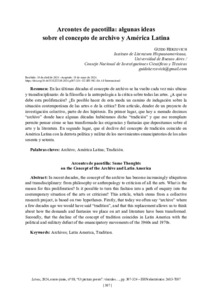Por favor, use este identificador para citar o enlazar este ítem:
https://repositorio.uca.edu.ar/handle/123456789/18822| Campo DC | Valor | Lengua/Idioma |
|---|---|---|
| dc.contributor.author | Herzovich, Guido | es |
| dc.coverage.spatial | América Latina | es |
| dc.date.accessioned | 2024-09-23T21:47:34Z | - |
| dc.date.available | 2024-09-23T21:47:34Z | - |
| dc.date.issued | 2024 | - |
| dc.identifier.issn | 0326-3363 (impreso) | - |
| dc.identifier.issn | 2683-7897 (online) | - |
| dc.identifier.uri | https://repositorio.uca.edu.ar/handle/123456789/18822 | - |
| dc.description.abstract | En las últimas décadas el concepto de archivo se ha vuelto cada vez más ubicuo y transdisciplinario: de la filosofía o la antropología a la crítica sobre todas las artes. ¿A qué se debe esta proliferación? ¿Es posible hacer de esta moda un camino de indagación sobre la situación contemporánea de las artes o de la crítica? Este artículo, deudor de un proyecto de investigación colectivo, parte de dos hipótesis. En primer lugar, que hoy a menudo decimos “archivo” donde hace algunas décadas hubiéramos dicho “tradición” y que ese reemplazo permite pensar cómo se han transformado las exigencias y fantasías que depositamos sobre el arte y la literatura. En segundo lugar, que el declive del concepto de tradición coincide en América Latina con la derrota política y militar de los movimientos emancipatorios de los años sesenta y setenta. | es |
| dc.description.abstract | In recent decades, the concept of the archive has become increasingly ubiquitous and transdisciplinary: from philosophy or anthropology to criticism of all the arts. What is the reason for this proliferation? Is it possible to turn this fashion into a path of enquiry into the contemporary situation of the arts or criticism? This article, which stems from a collective research project, is based on two hypotheses. Firstly, that today we often say “archive” where a few decades ago we would have said “tradition”, and that this replacement allows us to think about how the demands and fantasies we place on art and literature have been transformed. Secondly, that the decline of the concept of tradition coincides in Latin America with the political and military defeat of the emancipatory movements of the 1960s and 1970s. | es |
| dc.format | application/pdf | es |
| dc.language.iso | spa | es |
| dc.publisher | Pontificia Universidad Católica Argentina. Facultad de Filosofía y Letras. | es |
| dc.rights | Atribución-NoComercial-CompartirIgual 4.0 Internacional | * |
| dc.rights.uri | http://creativecommons.org/licenses/by-nc-sa/4.0/ | * |
| dc.source | Letras 2024 (89) | es |
| dc.subject | ARCHIVO | es |
| dc.subject | TRADICION | es |
| dc.title | Arcontes de pacotilla: algunas ideas sobre el concepto de archivo y América Latina | es |
| dc.title | Arcontes de pacotilla: some thoughts on the concept of the archive and Latin America | es |
| dc.type | Artículo | es |
| dc.identifier.doi | 10.46553/LET.89.2024.p307-324 CC-BY-NC-SA 4.0 | - |
| uca.disciplina | LITERATURA | es |
| uca.issnrd | 1 | es |
| uca.affiliation | Fil: Herzovich, Guido. Universidad de Buenos Aires. Instituto de Literatura Hispanoamericana; Argentina | es |
| uca.affiliation | Fil: Herzovich, Guido. Consejo Nacional de Investigaciones Científicas y Técnicas; Argentina | es |
| uca.version | publishedVersion | es |
| item.fulltext | With Fulltext | - |
| item.grantfulltext | open | - |
| item.languageiso639-1 | es | - |
| Aparece en las colecciones: | LETRAS - 2024 nro. 89 - “Ut pictura poesis”: vínculos contemporáneos entre arte y literatura | |
Ficheros en este ítem:
| Fichero | Descripción | Tamaño | Formato | |
|---|---|---|---|---|
| arcontes_pacotilla_ideas.pdf | 531,91 kB | Adobe PDF |  Visualizar/Abrir |
Este ítem está sujeto a una Licencia Creative Commons

